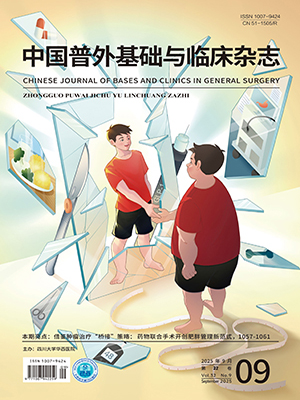| 1. |
汪晓东, 刘健博, 李立. 数据库建设第五部分·结直肠癌的肿瘤特征—模块的设计(二). 中国普外基础与临床杂志, 2020, 27(4): 483-488.
|
| 2. |
汪晓东, 刘健博, 李立. 数据库建设第五部分: 结直肠癌的肿瘤特征—模块的设计(一). 中国普外基础与临床杂志, 2020, 27(3): 345-349.
|
| 3. |
Benson AB, Venook AP, Al-Hawary MM, et al. Rectal Cancer, Version 2. 2022, NCCN Clinical Practice Guidelines in Oncology. J Natl Compr Canc Netw, 2022, 20(10): 1139-1167.
|
| 4. |
汪晓东, 由屹先, 余其澳, 等. 数据库建设第九部分: 结直肠癌新辅助治疗的标签与结构化. 中国普外基础与临床杂志, 2021, 28(6): 799-804.
|
| 5. |
汪晓东, 李立. 数据库建设第一部分: 个人数据的标签与结构化. 中国普外基础与临床杂志, 2019, 26(3): 335-342.
|
| 6. |
Weiser MR. AJCC 8th edition: colorectal cancer. Ann Surg Oncol, 2018, 25(6): 1454-1455.
|
| 7. |
国家卫生健康委员会医政司, 中华医学会肿瘤学分会, 顾晋, 等. 中国结直肠癌诊疗规范 (2023版). 消化肿瘤杂志 (电子版), 2023, 15(3): 177-206.
|
| 8. |
Bruheim K, Guren MG, Skovlund E, et al. Late side effects and quality of life after radiotherapy for rectal cancer. Int J Radiat Oncol Biol Phys, 2010, 76(4): 1005-1011.
|
| 9. |
Heriot AG, Tekkis PP, Fazio VW, et al. Adjuvant radiotherapy is associated with increased sexual dysfunction in male patients undergoing resection for rectal cancer: a predictive model. Ann Surg, 2005, 242(4): 502-510, 510-511.
|
| 10. |
Acquati C, Hendren S, Wittmann D, et al. Psychological and sexual distress in rectal cancer patients and partners. Psychooncology, 2022, 31(6): 920-928.
|
| 11. |
Portale G, Valdegamberi A, Cavallin F, et al. Effect of age and comorbidities on short- and long-term results in patients undergoing laparoscopic curative resection for rectal cancer. J Laparoendosc Adv Surg Tech A, 2019, 29(3): 353-359.
|
| 12. |
How P, Evans J, Moran B, et al. Preoperative MRI sphincter morphology and anal manometry: can they be markers of functional outcome following anterior resection for rectal cancer?. Colorectal Dis, 2012, 14(6): e339-e345.
|
| 13. |
胡曦元, 崔文, 郭超. 中国中老年居民体检情况及其前倾、使能、需求、健康行为影响因素分析. 中国公共卫生, 2022, 38(10): 1253-1257.
|
| 14. |
Hisamatsu Y, Kuriyama N, Fujimoto Y, et al. Indications for laparoscopic surgery for older rectal cancer patients with comorbidities. Surg Today, 2021, 51(5): 721-726.
|
| 15. |
Feeney G, Sehgal R, Sheehan M, et al. Neoadjuvant radiotherapy for rectal cancer management. World J Gastroenterol, 2019, 25(33): 4850-4869.
|
| 16. |
Motamedi MAK, Mak NT, Brown CJ, et al. Local versus radical surgery for early rectal cancer with or without neoadjuvant or adjuvant therapy. Cochrane Database Syst Rev, 2023, 6(6): CD002198.
|




